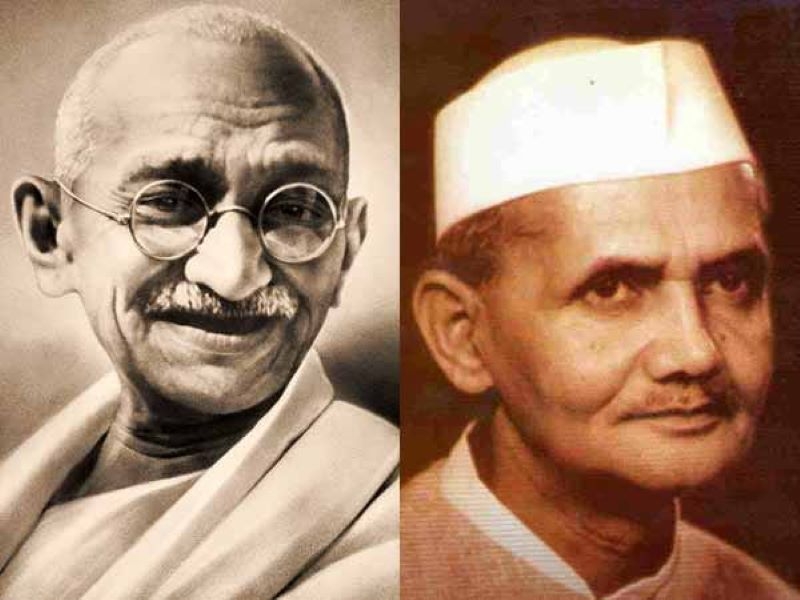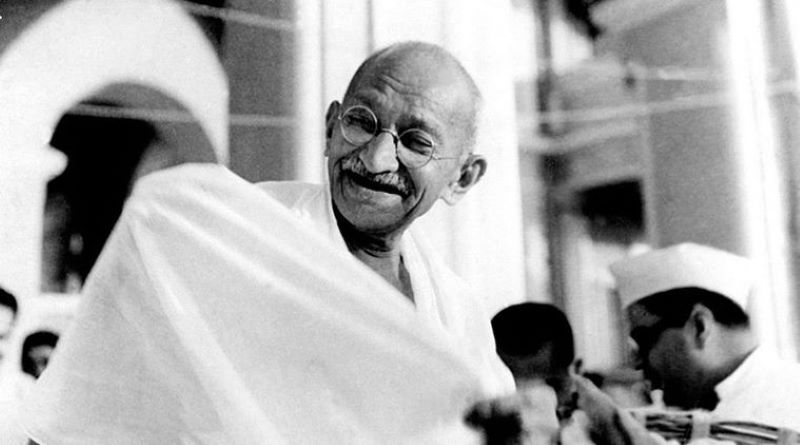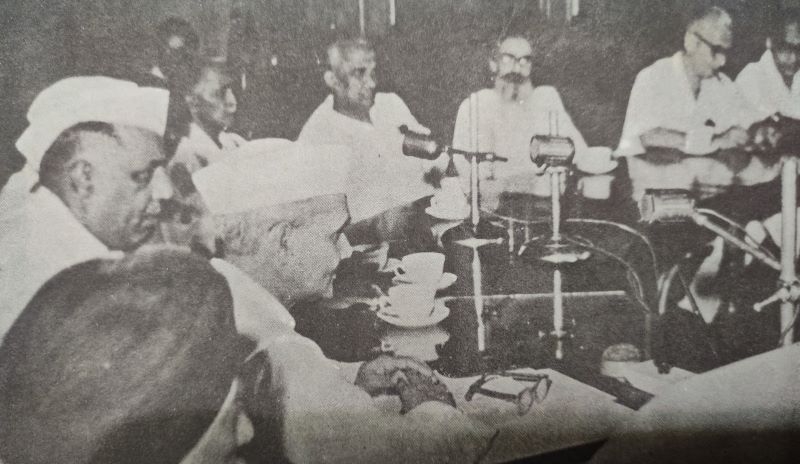Gandhi, Shastri and the RSS
02 Oct 2021 11:00:36
The country is observing the 152nd birth anniversary of Mahatma Gandhi and the 117th birth anniversary of Lal Bahadur Shastri – the two great sons of Mother Bharat today.
Mohandas Karamchand Gandhi who came to be known as ‘Mahatma’ delivered his message of humanity, peace, brotherhood, love, compassion, non-violence, and truth- the new weapons with which he earned freedom for the nation and inspired many others in the world to follow his path.

Gandhiji, who took over the reins of the Congress party after the demise of Lokmanya Bal Gangadhar Tilak in 1920, added a new dimension of peace, non-violence, and satyagraha to inspire the masses to sacrifice for the freedom of the motherland. This was unheard of earlier, but millions inspired by his new weapons did sacrifice all they had at the altar of the freedom struggle.
Carrying the message of freedom to the last man in the row was the greatest contribution of the Mahatma to the Indian society and the freedom struggle notwithstanding his extreme appeasement of Muslims.
Lal Bahadur Shastri will be remembered for his Himalayan efforts to raise the morale of the Bharatiya people and the Armed forces as well from the shock of the defeat in the 1962 war with China. On October 20, 1962, China had invaded Bharat and gave a crushing defeat to the Bharatiya Armed forces. Our forces were not well prepared and equipped to fight the Red Dragon but still, they put up a brave fight. However, we lost.
This defeat has caused serious damage to our national psyche and pride. But it was Shastri, the second Prime Minister of Bharat who forced the Pakistanis to bite the dust in the battlefields when Pakistan attacked our borders in 1965. This man, not tall as his predecessor, but firm in convictions, gave a free hand to the armed forces and they, in turn, avenged the 1962 debacle by giving a crushing and humiliating defeat to the Pakistani army demolishing the American bombers and the invincible Patton Tanks.
The Rashtriya Swayasevak Sangh (RSS) always admires these two great sons of Mother Bharat for their invaluable contribution to the Mother Bharat’s freedom struggle and raising the morale of the people. But there is more than that.
Gandhi’s first encounter with the RSS was in 1934 when he happened to visit an RSS camp near his ‘kutir’ in Wardha. When he went there, he was well received with due respect and honor by Hari Krishna alias Appaji Joshi, who was considered as the ‘right hand’ of RSS founder Dr. K. B. Hedgewar.
Gandhiji spent some time in the camp; enquired about the castes of swayamasevaks and to his surprise greeted with an answer: “We are all Hindus here; we don’t recognize nor do we care to know the caste of our colleagues. We are all sons of Mother Bharat and hence, brothers.”
Gandhiji was really surprised. He was relentlessly trying to erase the curse of untouchability from the Hindu society and here he found the practice of what he dreamt of achieving. He enquired with Appaji Joshi about the founder and expressed his desire to meet him, if possible. So, the meeting was arranged the next day when Dr. Hedgewar visited the camp.
During that hour-long meeting Gandhiji had many questions for Dr. Hedgewar, such as when he was working with the Congress (Dr. Hedgewar was a provincial leader of the Congress then) why did not he started his movement within the Congress party; and why organizing only the Hindus and many others. Dr. Hedgewar politely responded to his queries and at the end of the meeting a much-satisfied Gandhi blessed him and his mission. The entire conversation between these two great sons of Mother Bharat is available in the biography of Dr. Hedgewar penned by N. H. Palkar in Marathi.
Dr. Hedgewar passed away in 1940. Those were the days of intense freedom struggle and at the global level the world was divided into two warring camps. That was an opportune time to intensify the freedom struggle and the Congress under Gandhi’s leadership decided to launch the ‘Quit India’ movement in 1942. Often questions are raised about the alleged non-participation of RSS in this movement. The critics of the Sangh seldom miss any chance to blame it for remaining ‘aloof’ and even ‘siding with the British’ during this movement.
However, when this most important decision was being taken, the Congress and the Mahatma did not deem it fit to understand the mood of the country and to seek cooperation from various other parties and organizations for this movement. Maybe, they thought it was only the responsibility of the Congress party to liberate the country. But the British were clever than the Congress leaders and put all of them behind the bar before the movement could be officially launched.
No wonder then that movement went astray in the absence of the leadership. But even during that chaotic days many Sangh leaders and Swayamsevaks came forward to offer safe shelter to underground Congressmen/women and a thousand others actually participated in the movement with hundreds kissing the gallows and an equal number languishing in jails. But the present Congress leaders would not recognize this contribution of RSS as it may not suit to their election and power politics.
1947 was the most tragic year in modern Bharat’s history. The country was partitioned and witnessed mindless violence, rapes, cruelty, and bloodshed. The RSS swayamsevaks played a heroic role in saving the Hindus from the invading Muslims in what is now called Pakistan and brought them safely to Bharat even rising their own lives. The Mahatma was touring the violence-affected areas of Bengal appealing Muslims and Hindus for maintaining peace.
Some Congress leaders and Muslims complained to him about the alleged involvement of RSS in these riots. The Mahatma was staying at ‘Bhangi Colony’ in Delhi then. In front of his ‘ashram’, an RSS shakha was conducted. He expressed his desire to visit that shakha which was promptly accepted and arrangements were made for his visit.

When Gandhiji visited this shakha on 27th Sept 1947 and addressed the 500 swayamsevaks assembled then. He recalled his earlier visit to the RSS camp near Wardha where he met the founder Dr. Hedgewar and how he was impressed by the rigorous discipline, the total absence of untouchability, and simplicity of the swayamasevaks. “I have always believed that any organization which is inspired by the ideal of service and self-sacrifice, is bound to grow in strength,” the Mahatma said.
Dr. Hedgewar’s successor M S Golwalkar alias Sri Guruji also had very high regard for the Mahatma. During the unveiling of Gandhiji’s statue in Sangli in Maharashtra coinciding with his birth centenary, Golwalkar spoke very highly of him. He said, “Mahatma Gandhi was born like any other common man, but he attained the status of a great man due to his deeds and love in his conscience. We should mold our life on his lines.”
Some Congressmen tried to misinform and mislead Gandhiji about the involvement of the RSS in violence against Muslims to the extent that even the Mahatma was compelled to succumb to their misleading propaganda. In his speech at a prayer meeting on December 3, 1947, Gandhi expressed his lamentation: ‘Shall I believe the Congress, or the Muslims, or the Hindu Mahasabha or the RSS?’
Gandhi had his own ideas for the future development of Bharat. His concept of ‘Ram Rajya’, ‘Buniyadi Shiksha’, ‘Gram Swaraj’ etc. was neatly laid down in his book ‘Hind Swaraj’. The Mahatma foresaw a clear picture of Bharat’s progress and performance based on ‘pure swadeshi vision’ throwing off the 'slave mindset’, But alas! His very trusted disciple, Pt. Jawaharlal Nehru whom Gandhi selected for leading Independent Bharat superseding the provincial Congress committees’ preference for Sardar Patel, rejected his ideas lock, stock and barrel and preferred a heavy industrial development model for New Bharat.
Nehru was thoroughly impressed and influenced by the western values and ethos and wanted Bharat to give up the old, traditional ways of development. Dr. Mohan Bhagwat, Sarsanghchalak of RSS rightly said “people with a slavish mindset accepted the western set of values as a model, denouncing our forefathers, pride, and culture as inferior and disgraceful and engaged themselves in imitating and flattering the West. Its massive influence is visible in the country’s direction and condition even today”, he observed.
Bhagwat said that Gandhi believed in the “Swa-based [self-based or self-dependent] reorganization” of Bharat, adding that he had firmly believed in social equality, harmony, and channeled his vision into action. “We must perceive, understand, and manifest it in our life,” he said. “On account of this, even those who had minor differences of opinion with him also viewed with reverence.”
K. Sthanumalayan, another regional RSS leader from South said, “If Gandhiji were alive today, he would have been with the RSS because it followed his idea of Gram Swaraj and worked for eradication of untouchability and caste discrimination.”
RSS Sah-Sarkaryawah Dr. Manmohan Vaidya said that the Sangh has kept Gandhiji’s ideals alive through its work on rural development, organic farming, cow conservation and protection, social equality and harmony, imparting education in one’s language and swadeshi economy and lifestyle and shall continue to do so.
Lal Bahadur Shastri & RSS: Nehru was hostile to RSS but his successor Lal Bahadur Shastri was ideologically closer to the Sangh. He invited Sri Guruji on many occasions for consultation on issues of national importance.
BJP veteran Lal Krishna Advani describing Shastri as a ‘dedicated Congressman’ said that his personal qualities won him the goodwill of the nation.
 Sri Golwalkar Guruji at a meeting with Prime Minister Lal Bahadur Shastri
Sri Golwalkar Guruji at a meeting with Prime Minister Lal Bahadur Shastri
During the 1965 Bharat-Pakistan war, Shastriji invited Sri Guruji for consultation. Shastri as Prime Minister and Dr. S Radhakrishnan as President and Supreme Commander of the armed forces foiled the infiltration bid of the Pak army and gained upper hand. At that time Shastriji decided to cut across the party lines and invited Sri Guruji to an all-party meeting.
The only point of confrontation between Shastri and RSS came when the former as Home Minister denied permission to Nepal’s King Mahendra Veer Vikram Shah Dev who has consented to be the chief guest at the RSS Makar Sankranman Utsav at Nagpur. Obviously, Shastri was under pressure from the top brass and had to toe the line maybe much against his heart and wishes. But in that, Bharat has lost a great opportunity to normalize ties with Nepal long ago in the sixties.
The purpose of the invitation was to task the Delhi Police with more strategic activities and relieve them of their routine duties which were then taken over by RSS workers, says Dr. Harish Chandra Barthwal in his book, The Rashtriya Swayamsewak Sangh: An Introduction. Barthwal even goes further to claim that upon Shastri's request, RSS workers also provided food and other essential supplies to soldiers deployed on the war front.
